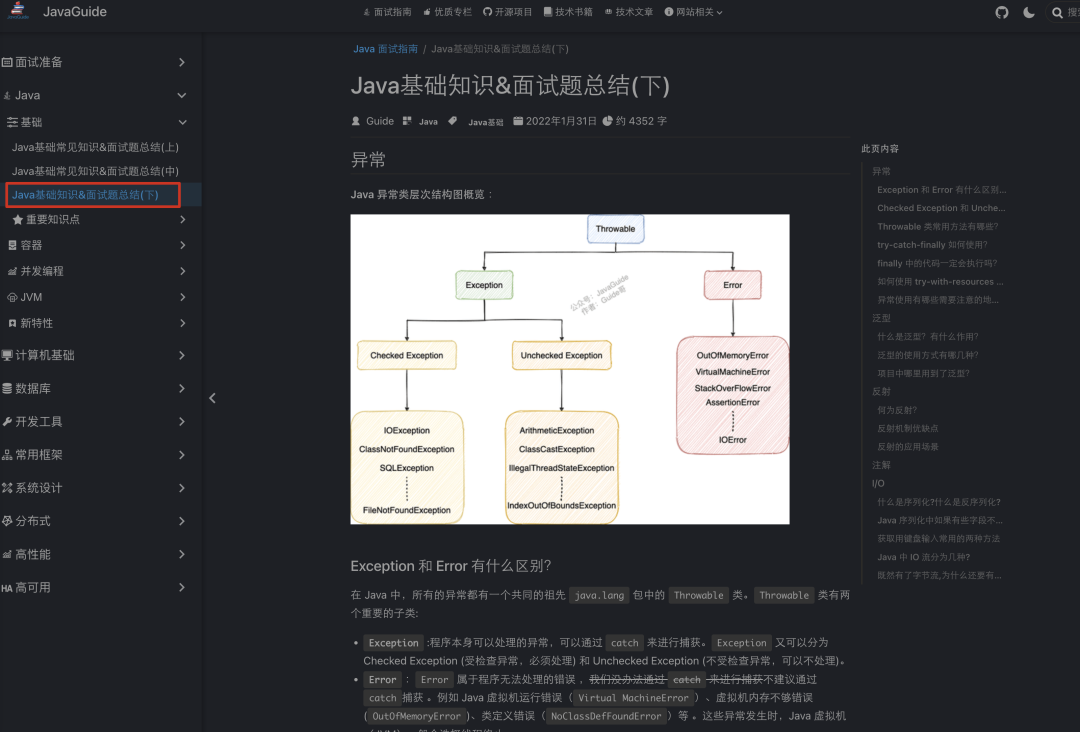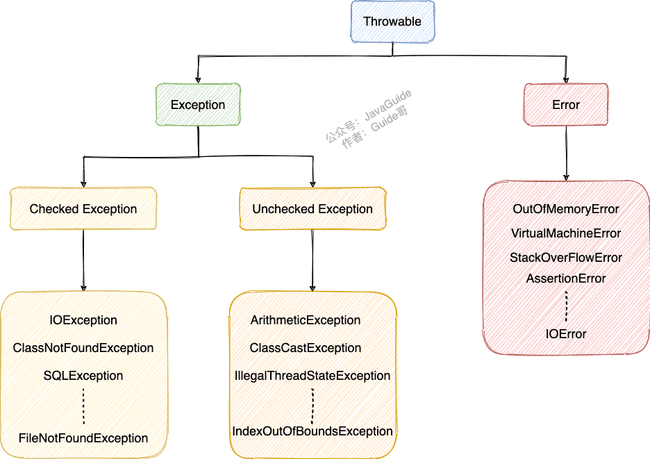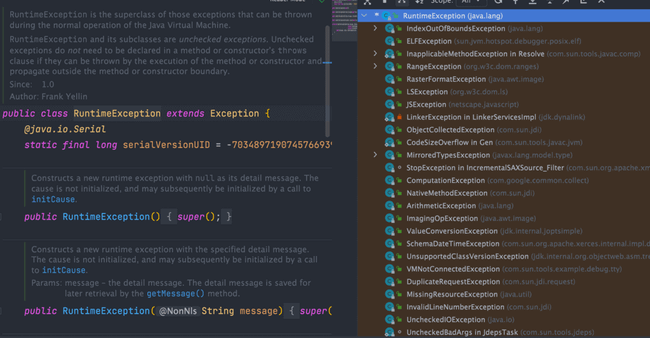你好,我是 Guide。秋招即将到来,我对 JavaGuide 的内容进行了重构完善,同步一下最新更新,希望能够帮助你。

前两篇:
- Java 基础常见知识点&面试题总结(上),2022 最新版!
- Java 基础常见知识点&面试题总结(中),2022 最新版!
Java 异常类层次结构图概览 :

在 Java 中,所有的异常都有一个共同的祖先 java.lang 包中的 Throwable 类。Throwable 类有两个重要的子类:
Exception:程序本身可以处理的异常,可以通过catch来进行捕获。Exception又可以分为 Checked Exception (受检查异常,必须处理) 和 Unchecked Exception (不受检查异常,可以不处理)。Error:Error属于程序无法处理的错误 ,我们没办法通过不建议通过catch来进行捕获catch捕获 。例如 Java 虚拟机运行错误(Virtual MachineError)、虚拟机内存不够错误(OutOfMemoryError)、类定义错误(NoClassDefFoundError)等 。这些异常发生时,Java 虚拟机(JVM)一般会选择线程终止。
Checked Exception 即 受检查异常 ,Java 代码在编译过程中,如果受检查异常没有被 catch或者throws 关键字处理的话,就没办法通过编译。
比如下面这段 IO 操作的代码:

除了RuntimeException及其子类以外,其他的Exception类及其子类都属于受检查异常 。常见的受检查异常有: IO 相关的异常、ClassNotFoundException 、SQLException...。
Unchecked Exception 即 不受检查异常 ,Java 代码在编译过程中 ,我们即使不处理不受检查异常也可以正常通过编译。
RuntimeException 及其子类都统称为非受检查异常,常见的有(建议记下来,日常开发中会经常用到):
NullPointerException(空指针错误)IllegalArgumentException(参数错误比如方法入参类型错误)NumberFormatException(字符串转换为数字格式错误,IllegalArgumentException的子类)ArrayIndexOutOfBoundsException(数组越界错误)ClassCastException(类型转换错误)ArithmeticException(算术错误)SecurityException(安全错误比如权限不够)UnsupportedOperationException(不支持的操作错误比如重复创建同一用户)- ......

String getMessage(): 返回异常发生时的简要描述String toString(): 返回异常发生时的详细信息String getLocalizedMessage(): 返回异常对象的本地化信息。使用Throwable的子类覆盖这个方法,可以生成本地化信息。如果子类没有覆盖该方法,则该方法返回的信息与getMessage()返回的结果相同void printStackTrace(): 在控制台上打印Throwable对象封装的异常信息
try块 : 用于捕获异常。其后可接零个或多个catch块,如果没有catch块,则必须跟一个finally块。- *
catch块 : 用于处理 try 捕获到的异常。 finally块 : 无论是否捕获或处理异常,finally块里的语句都会被执行。当在try块或catch块中遇到return语句时,finally语句块将在方法返回之前被执行。
代码示例:
try {
System.out.println("Try to do something");
throw new RuntimeException("RuntimeException");
} catch (Exception e) {
System.out.println("Catch Exception -> " + e.getMessage());
} finally {
System.out.println("Finally");
}
输出:
Try to do something
Catch Exception -> RuntimeException
Finally
注意:不要在 finally 语句块中使用 return! 当 try 语句和 finally 语句中都有 return 语句时,try 语句块中的 return 语句会被忽略。这是因为 try 语句中的 return 返回值会先被暂存在一个本地变量中,当执行到 finally 语句中的 return 之后,这个本地变量的值就变为了 finally 语句中的 return 返回值。
jvm 官方文档中有明确提到:
If the
tryclause executes a return, the compiled code does the following:
- Saves the return value (if any) in a local variable.
- Executes a jsr to the code for the
finallyclause.- Upon return from the
finallyclause, returns the value saved in the local variable.
代码示例:
public static void main(String[] args) {
System.out.println(f(2));
}
public static int f(int value) {
try {
return value * value;
} finally {
if (value == 2) {
return 0;
}
}
}
输出:
0
不一定的!在某些情况下,finally 中的代码不会被执行。
就比如说 finally 之前虚拟机被终止运行的话,finally 中的代码就不会被执行。
try {
System.out.println("Try to do something");
throw new RuntimeException("RuntimeException");
} catch (Exception e) {
System.out.println("Catch Exception -> " + e.getMessage());
// 终止当前正在运行的Java虚拟机
System.exit(1);
} finally {
System.out.println("Finally");
}
输出:
Try to do something
Catch Exception -> RuntimeException
另外,在以下 2 种特殊情况下,finally 块的代码也不会被执行:
- 程序所在的线程死亡。
- 关闭 CPU。
相关 issue: https://github.com/Snailclimb/JavaGuide/issues/190。
